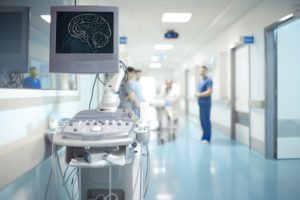
When you hear the word ultrasound, the first thing that comes to mind may be the procedure a pregnant woman gets to see the unborn child growing inside her. Ultrasound scans are a type of medical imaging test that uses sound waves set at a high frequency to produce live images from inside your body. Ultrasound is also known as sonography and is similar to sonar and radar, which help to detect things in the atmosphere. Ultrasound can help to detect potential issues or problems inside your organs, blood vessels, and soft tissues without using any invasive procedures. When you get an ultrasound with Marietta imaging, the technician will use a wand-like apparatus that glides over your skin and produces images from what is underneath. Ultrasounds are used in a variety of contexts and can help to identify pain, swelling, and other issues with internal organs like the bladder, kidneys, ovaries, and brain.
How Does an Ultrasound Work?
Preparation for an ultrasound may vary depending on what area of the body will be scanned. For example, your doctor may request that you fast before an ultrasound of the abdominal area. Ultrasound uses safe technology and does not expose you to any radiation, unlike X-rays or CT scans. That is why ultrasounds are so common for examining a fetus as it develops through pregnancy. You will likely wear a hospital gown and lie down on a table where an ultrasound technician can easily access the area to be scanned. The technician will apply a lubricating jelly to the area that will be scanned so that the wand-like apparatus can move easily across your skin. This lubricating jelly also helps to transmit the sound waves that are used to produce the image. The ultrasound transducer sends sound waves into your body and the image is created as those waves echo when they hit organs or bones.
Ultrasounds and Neurology
You might be surprised to learn that ultrasounds can also be used in neurology, specifically on the brain. Ultrasounds were first utilized to examine a growing baby’s brain before the skull is fully formed. Now, ultrasound technology has advanced and expanded into other areas of neurology to help penetrate through the skull without the need for surgical intervention. Medical conditions or injuries to the brain can be difficult to access and treat, which is why many prefer to try conservative and non-invasive approaches before turning to more invasive options like surgery. The brain is a very sensitive organ and its healthy functioning is necessary for your entire body’s ability to function properly. An injury to or issue with the brain can lead to a wide range of symptoms that can affect your entire musculoskeletal system and nervous system. Your doctor may recommend an ultrasound to help diagnose your injury or condition.
An ultrasound of the brain is still similar to the sonography described above, where a handheld device called an ultrasound transducer passes over the affected area to project live images onto a monitor. If your doctor suggests an ultrasound on the brain or spinal cord, this type of Marietta imaging procedure will be entirely pain-free and non-invasive. An ultrasound can help to detect medical conditions or injuries in the brain or spinal cord in people of all ages, as well as to measure the development of a fetus. When you get an ultrasound for your brain, it also measures the brain waves and can help to detect any restriction of blood flow of the arteries in your neck that support your brain. Any blockages to arteries in your neck can actually decrease the supply of oxygen and nutrient-rich blood to the brain, which can lead to a stroke or other neurological issues. In fact, the ultrasound’s sonar-like capabilities make it an excellent option for monitoring the sound of blood flow throughout the body, not just the arteries that support the brain. Talk to your neurologist to find out more about how ultrasound therapy can help provide non-invasive support for tremors, Parkinson’s disease, Alzheimer’s disease, and even chronic pain.
If you are looking for a clinic for medical imaging, then visit AICA Orthopedic in Marietta to learn more about ultrasounds, X-rays, CT scans, MRIs, and other advanced and state-of-the-art technologies. Learn why doctors recommend MRI scans and how they can help to cure diseases.